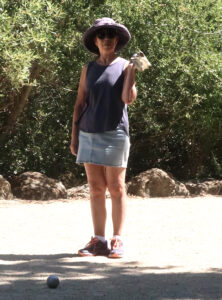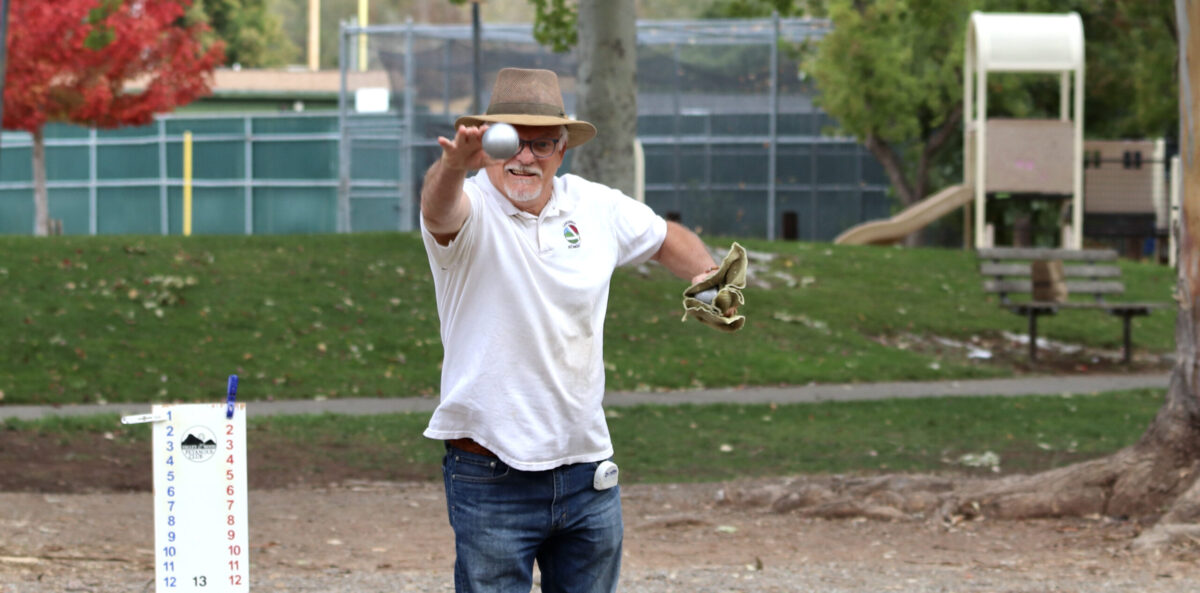
It is said that “Travel broadens the mind” so, always wishing to be enlightened, yesterday, accompanied by my mate, I journeyed to fabled Lamorinda.
For those of you not quite familiar with that word, it is the portmanteau from 3 adjacent cities: Lafayette, Moraga , and Orinda. From Marin, it is a rather tortuous expedition, but nothing is too hard for a true believer.
The first thing that you should know about the Lamorinda Pétanque Club is that it is a very welcoming place. Just show up with your boules and very soon you will be included in a game. This has a lot to do with delightful Jackie Hackett; if I am not mistaken, she is the president of the club and she is endowed with a great personality. She always warmly greets newcomers and makes them feel immediately comfortable. She is an excellent player to boot.
Lamorinda, I believe, attracts many people by the caliber of its players. Many people will travel rather long distances for the privilege of measuring with worthwhile competitors, particularly shooters. Among those, Brennan, Pete Hackett, Eric Thiebault, Max, Sebastian, Antoine Lofaro, and a few more that I am not familiar with.
Did I forget to mention Ann Krilanovich? She was there, also shooting her heart away.
I came to Lamorinda to play a few games, but my !%&#*$ back did not allow me to proceed as intended. After two rounds I had to quit. But I still had the opportunity to play with Brennan and Pete Hackett and it was quite an experience. Both are great shooters and a joy to play with. In a game where I teamed up with a certain Ken (?) and Tamara paired with Pete, Pete scored many direct hits that blew the cochonnet to a great distance. There were at least 4 or 5 occasions when the cochonnet ended up about 20 meters from the starting circle and when we labored to finish the round.
Pete, like his wife Jackie, is also a very pleasant and industrious fellow. Since (like many Tamalous) he is also afflicted with a troublesome back, he came up with a little trick to pick up a wooden cochonnet and a plastic circle with a magnet. It is a great idea that I will definitely adopt and use whenever I am playing.
As I previously said, pétanque is a sport, but it is also a great occasion to keep in touch and socialize with your friends. You don’t even have to play; just show up and enjoy the companionship… and many do.
After quitting the game, I managed to take a few quick shots that you can view in the album called “Lamorinda”. Due to the harsh lighting conditions, they are not great but reflect the atmosphere of the event.
It was a great day, and since I still have a lot to learn, I will do my best to return.
Thank you again Jackie and Pete for your warm embrace.
Alain
Watch the pictures in “My photos
Erratum: Thank you to Gilbert Sonet for setting me straight. Pascal Gravier is the President of the Lamorinda club and Jackie is the secretary. My apologies to both for this error.

 With the pandemic showing signs of ebbing, will kisses and hugs soon return? It is a little early to tell, but I am confident that they will be back very soon, especially among the
With the pandemic showing signs of ebbing, will kisses and hugs soon return? It is a little early to tell, but I am confident that they will be back very soon, especially among the  Vigils, prayers, flowers, candles, speeches, tears… these images of grief show up on our tellies with a dull regularity… and it is a pathetic waste of time. Despite the ongoing
Vigils, prayers, flowers, candles, speeches, tears… these images of grief show up on our tellies with a dull regularity… and it is a pathetic waste of time. Despite the ongoing